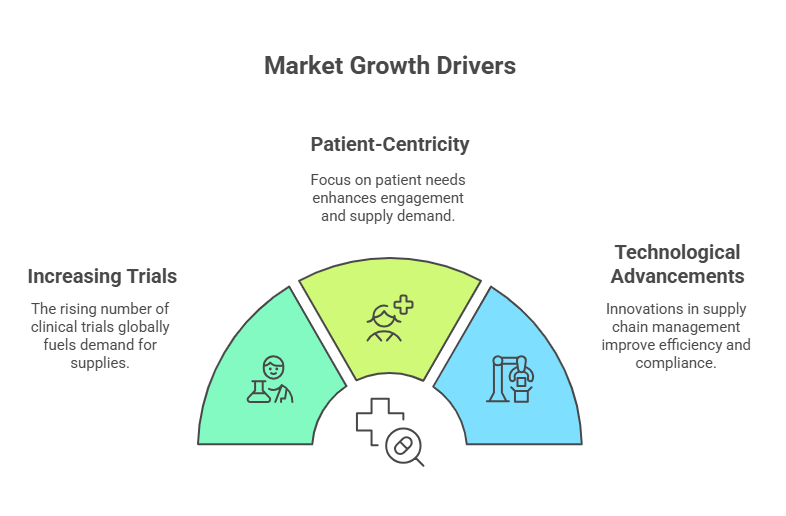The market for clinical trial supplies is about to change a lot because there is a growing need for new ways to help people with their health and because medical research is making progress. As the world changes, the clinical trials market is anticipated to reach USD 8.18 billion in 2030 from USD 5.34 billion in 2025, with a significant CAGR of 8.9%.. Some of the things that are helping this growth path are more clinical trials, a greater focus on patient-centered approaches, and the use of technology in managing the supply chain. This report looks at the things that affect the market for clinical trial supplies, including trends, problems, and the future.
Introduction
Clinical trials are the basis of medical innovation because they let scientists test new drugs, equipment, and treatment methods to see how well they work and how safe they are. Providing research materials like investigational drugs, medical equipment, and extra supplies is an important part of these trials. There are many different types of goods and services on the market for clinical trial supplies that are meant to make the complicated logistics of clinical research easier.
As we move into a period of rapid progress in biotechnology, pharmaceuticals, and personalised medicine, the need for clinical trial supplies is expected to grow. Recent predictions say that the market for clinical trial supplies will grow quickly and be worth $8.18 billion by 2030. This report will look closely at the reasons for this growth, the problems that stakeholders have faced, and the changes that will affect clinical trial supplies in the future.
Market Overview
There is a wide range of goods and services needed to run clinical trials successfully in the market for clinical trial supplies. These supplies include medical devices, investigational medicinal products (IMPs), packaging materials, labelling solutions, and logistics services. Some of the things that affect the market are rules and regulations, the complexity of clinical trials, and the growing focus on putting patients first.
Driving Forces Behind Market Growth

Increasing Number of Clinical Trials
One of the main reasons the market for clinical trial supplies is growing is that more and more clinical trials are being done around the world. The growing need for new treatments to address unmet medical needs is driving a surge in research and development (R&D) activity in the biotechnology and pharmaceutical industries. The number of clinical trials around the world has grown a lot in the past few years, with thousands of trials being registered in different therapeutic areas.
A report from the World Health Organisation (WHO) says that the number of registered clinical trials has been steadily rising over the past ten years. This pattern is likely to continue, which will make the need for clinical trial supplies even greater. As the number of trials grows, it will become harder to get materials and make sure they arrive on time.
Emphasis on Patient-Centric Approaches
As the clinical trial industry moves towards patient-centricity, making the patient experience better and getting them more involved in research is becoming more and more important. Sponsors and researchers are starting to realise how important it is to understand patients’ needs, wants, and points of view throughout the clinical trial process. This change is making it more important to have products that encourage patients to get involved, like digital health technologies, telemedicine solutions, and home healthcare kits.
Patient-centered approaches are changing the way clinical trials are designed and run, in addition to making it easier to hire and keep staff. The market is getting bigger because more and more people want clinical trial supplies that are made to fit their needs.
Technological Advancements in Supply Chain Management
The use of technology in supply chain management is changing the market for clinical trial supplies. Improvements in data analytics, inventory management, and logistics are making supply chain operations more accurate and efficient. Thanks to advanced tracking systems and real-time data analytics, stakeholders can look at changes in demand, improve delivery methods, and keep an eye on inventory levels.
To make sure that clinical trial supplies meet all the rules, new technologies are also making them easier to track and follow the rules. The use of blockchain technology, which makes supply chain transactions easier to see and safer, is growing in the clinical trial ecosystem.
Key Challenges in the Clinical Trial Supplies Market
Despite the promising growth prospects, the market for clinical trial supplies faces a number of problems that could slow its progress.
Regulatory Compliance
For people who work in the clinical trial supplies market, following the rules is still a big problem. Because the rules set by health authorities are so complicated and always changing, it is very important to follow them exactly. This means making sure that the supplies for clinical trials are properly labelled, meet quality standards, and follow the rules for shipping. It can be hard to figure out what the rules are, especially for businesses that work in more than one area with its own set of rules. Not following the rules can lead to delays, higher costs, and sometimes even the rejection of clinical trial applications.
Supply Chain Disruptions
The COVID-19 pandemic and other events have caused the global supply chain to be disrupted in ways that have never happened before. Delays in getting clinical trial supplies made and sent out can have a big effect on trial schedules and research results. Things like poor logistics, trouble getting things from one place to another, and a lack of raw materials can all make it harder for supplies to move smoothly. Stakeholders need to use strong supply chain strategies to lower these risks and make sure that important materials are delivered on time. This could mean buying supply chain technology, making backup plans, and getting supplies from different places.
Cost Pressures
Keeping costs down is very important for sponsors and contract research organisations (CROs) that are running clinical trials. The rising costs of running clinical trials, such as buying supplies, can make it hard to pay for them and make it harder to decide if research projects are possible. As competition heats up in the biotechnology and pharmaceutical industries, companies are looking for ways to save money without giving up quality.
Trends Shaping the Future of Clinical Trial Supplies
As the market for clinical trial supplies keeps changing, a number of trends are starting to show up. These trends will have an effect on the market’s future.
The Rise of Decentralised Clinical Trials
Decentralised clinical trials, or DCTs, are becoming more and more popular because traditional trial models are hard to work with. DCTs use technology to make it easier to do telehealth consultations, keep an eye on patients, and collect data from afar. This plan makes it easier for people to get into clinical trials and get more people to take part, especially those who live in areas that don’t get enough care. The use of DCTs is driving up the need for cutting-edge clinical trial supplies like wearable technology, home healthcare kits, and digital platforms that make it easier to collect data in real time. As DCTs become more common, people who are involved in the supply chain will have to change how they do things to fit these new models.
Increasing Focus on Sustainability
The market for clinical trial supplies is starting to think about it. As more and more people learn about how their actions affect the environment, sustainable methods of sourcing, packaging, and managing waste are becoming more and more important. Businesses are looking for alternatives to packaging materials that are better for the environment in order to lower their carbon footprint.
Regulatory bodies are also starting to put more emphasis on sustainability in clinical research. This is encouraging sponsors and suppliers to use more environmentally friendly methods. This trend makes it possible for new ideas to be used in the creation and production of clinical trial supplies that help meet goals for environmental sustainability.
The growth of personalised medicine Personalised medicine is changing the market for clinical trial supplies. As treatments become more personalised for each patient using genetic, biomarker, and phenotypic data, the need for specialised supplies is growing. Clinical trial designs need to take into account how complicated personalised treatments can be, which means that supply chain strategies need to be flexible. Stakeholders need to put money into processes and technologies that make it easier to make and deliver customised trial supplies. This includes better personalised packaging, creative ways to label things, and ways to make things in small batches.
Growth of Personalized Medicine
The market for supplies for clinical trials is expected to grow a lot, reaching a value of $8.18 billion by 2030. The market is changing to meet the needs of a healthcare system that is changing quickly. This is happening because there are more clinical trials, there is a focus on putting patients first, and supply chain management technology is getting better. However, problems like rising costs, broken supply chains, and following the rules must be fixed in order to take advantage of the chances in this fast-paced market.
As the industry works through these problems, new trends like decentralised clinical trials, sustainability efforts, and the rise of personalised medicine will have an effect on clinical trial supplies in the future. If stakeholders adapt to these changes and put money into creative solutions, they will be in a good position to do well in the changing clinical trial ecosystem. In the end, the market for clinical trial supplies will keep growing. This is important for speeding up the development of new treatments and improving patient outcomes around the world.




















